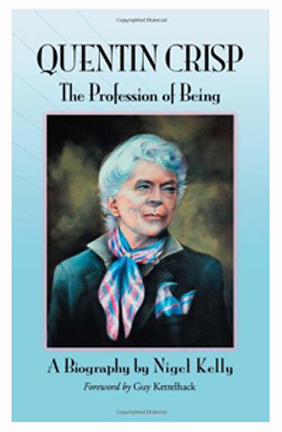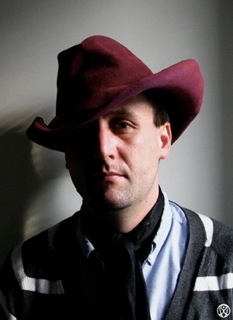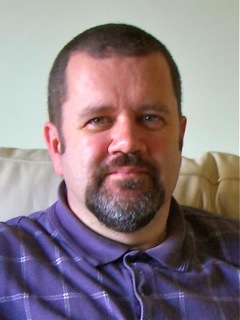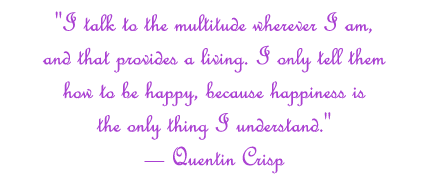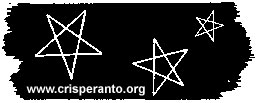
CRISPERANTO: THE QUENTIN CRISP ARCHIVES
|
||||||||||||||||
|
TAYLOR BLACK: Tell us about Nigel Kelly. Who is Nigel Kelly?
NIGEL KELLY: I was born, live and work in Northern Ireland as a senior analyst specializing in Internet development and programming. I have now started what I suppose I should call my “free-time career” as a writer. Since finishing Quentin’s biography I have written a science-fiction novel called The Humanity Factor? to be published by Fantasy Island Book Publishing of the USA. After high school I worked at many different jobs until I finally decided that it was time for me to take charge of my life and try to develop a career for myself. My local college was having an open night and so I went along. Not knowing what I wanted to, or indeed could do, I took an aptitude test which apparently showed that I have a highly analytical mind. So they suggested computers. I started studying IT and I have now worked in the industry for twenty-five years. TB: How did you first learn about Quentin Crisp? NK: Like most people of my generation I first became aware of Quentin through the televising of his autobiography The Naked Civil Servant in 1975. I was still in high school, but was completely blown away by this extraordinary human being. I recognized that here was a person of immense integrity, humanity, courage and intellect. A real-life hero. TB: Why a continued interest these many years since his death in 1999? NK: After watching The Naked Civil Servant, I followed his life and tried to read as many of his books as I could. However this was pre-Internet era, so it was difficult to get my hands on them. So since 1975 I have never lost interest. In fact as time passed, my interest grew. It seemed that the more I found out about him, the more interesting and extraordinary I discovered him to be. I also started to fully appreciate his philosophy. 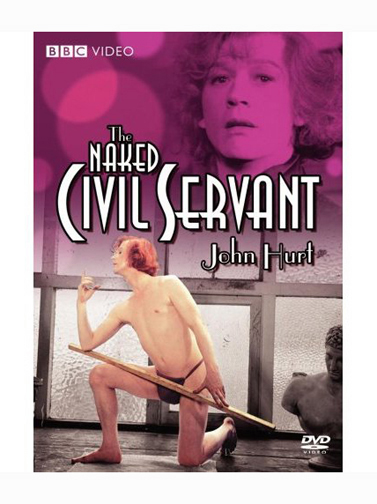 When Quentin died, even though he was almost ninety-one, I was shocked. I decided that I needed to do my part in trying to keep his memory and, by extension, his philosophy alive, so I created the website Quentin Crisp Info: Dedicated to the Memory of Quentin Crisp. Through it I made contact with some of his closest friends and it has grown significantly since its launch. Today, including mine, there are only two websites about Quentin. The other site is this site, Crisperanto: The Quentin Crisp Archives, which is run by his literary and estate executor Phillip Ward. When Quentin died, even though he was almost ninety-one, I was shocked. I decided that I needed to do my part in trying to keep his memory and, by extension, his philosophy alive, so I created the website Quentin Crisp Info: Dedicated to the Memory of Quentin Crisp. Through it I made contact with some of his closest friends and it has grown significantly since its launch. Today, including mine, there are only two websites about Quentin. The other site is this site, Crisperanto: The Quentin Crisp Archives, which is run by his literary and estate executor Phillip Ward.TB: What caused you to want to write about Quentin Crisp? How did it all come about? NK: Well it came about by accident—literally. In June 2007 my wife Karen and I were injured in a car accident. Thankfully my wife was less seriously injured, but I was off work for some months. I become extremely restless with nothing to do. But I could still write. So I started writing a book on Quentin Crisp. I didn't start seriously thinking that it would come to anything. I did it to occupy my mind; to stop myself going even crazier than I already was. When I mentioned to some of Quentin’s friends, whom I had already made contact with through the website, that I was writing a book, they were so encouraging! So it just grew from there. I didn't realize at the time that it would occupy most of my “free” time for the next three years. But I am still amazed that now four years on I have a book written that was published this past October 14th in the United States. It somehow seems a bit surreal. TB: Congratulations on the new book and may it have great success too. Now, what would you say is the essence of your book on Quentin Crisp? NK: Firstly, it is to simply tell the story of his life in as straightforward a manner as possible—if anything can be straightforward when dealing with such an extraordinary and complex person. I felt that his life was so exceptional that just telling it was enough. There was no need to elaborate or gives views or opinions. The story would tell all in itself. I did want to emphasize his philosophy, which as I have said I view as his greatest asset and his lasting contribution to the world. But I am not, like he was, a philosopher. I knew I did not have the skills to enter into a philosophical debate on the topic. So what I decided to do was to have a full section at the back of the book listing a selection of his bons mots.
TB: What was your process of researching for the book? NK: Well I suppose in a way I had been researching it for over thirty years. But when it came to writing the book my first source was his own autobiographies, The Naked Civil Servant, How to Become a Virgin and Resident Alien. Then there were the books that had been written about him since his death. The Stately Homo by Paul Bailey, Quentin & Philip by Andrew Barrow and Quentin Crisp: Outlines by Tim Fountain. But perhaps the most fascinating and most enlightening source for my research came from his friends. As I have already said I had made contact with some of his friends through the website: People like Guy Kettelhack, Phillip Ward, Tom Steele and Penny Arcade. TB: Was there any interesting information or tidbits about Mr. Crisp unearthed during your investigations for the biography? NK: Oh yes. I found out a lot of things about Quentin that I did not know. Again, exclusively through the people who had known him. People like British award-winning sculptor John W. Mills. He knew and worked with Quentin from 1948 until the late seventies. He had some wonderful anecdotes to tell. So the book contains many bits about Quentin that I think have never appeared in print before. Some, I feel, will surprise people. I won’t say more. You’ll have to read the book. 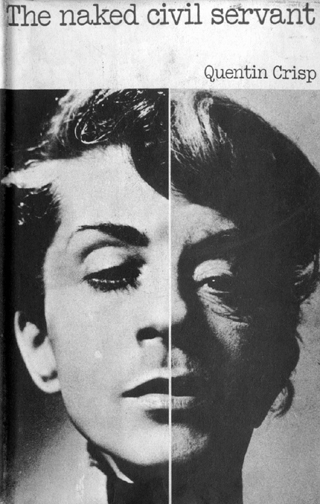 TB: Other than his initial influence on you as a human being, did you discover additional influence Quentin Crisp had on you during the creation of this new biography? TB: Other than his initial influence on you as a human being, did you discover additional influence Quentin Crisp had on you during the creation of this new biography?NK: Yes, in a strange way he actually helped me write the book. Quentin said that if you are going to write a book, you should not read other books in the same subject area of your own endeavor. If you do you will think you have to write like them. This he said was wrong, as in doing so you will lose your own unique voice. So that is what I did. TB: What sort of biographical perspective does your book offer? NK: I think people who are interested in Quentin want to know about his childhood, his first experiences with the world, how it formed his character and his unique philosophy of life. What was it that formed this truly exceptional human being? But I think people also want to know how he managed to have such an influence on other people and, indeed, the whole world. I hope this comes through in my book, especially via the contributions of those who knew him. TB: What are your future plans regarding Quentin Crisp and his legacy and your fan website dedicated to his memory and influence? NK: I shall always run my website and talk to anyone who wants to know about him. I have found that when I do people are surprised. They think they know about him. I would love to lecture on Quentin. I think it would help convey his philosophy and enlighten people about who he was. Maybe if the book is a success it might open up this possibility. TB: How do you think Quentin Crisp and his remarks/statements about homosexuality relate to modern day? Should homosexuals learn from those remarks/statements that he made at the time? NK: Many of Quentin’s statements were formed by his experiences growing up as a young gay man in Britain in the years between the First and Second World Wars. His treatment was harsh, to say the least. So we have to take this into consideration. I think no one would argue that things are much better today than a century ago. Of course, homophobia still exits and I suspect always will. But I feel many of his statements or observations are based on profound wisdom, which is applicable to everyone. He once said that if all we ever talked about was our sex lives, no one would have anything in common with anyone. He was also totally opposed to the idea of gay communities and once said that if the president was to declare that a gay reservation had been formed somewhere in America and that all gays had to go live there, he would burst into tears. There should be only one community—the human community, which encompasses everyone.
TB: What cultural influences are identified via Quentin Crisp? NK: Well I can say that here in Britain he is more responsible than anyone else for bringing the issue of homosexuality to the nation’s attention and more importantly to the nation’s understanding. So many people of my generation and older have said that they didn’t understand it until they watched The Naked Civil Servant. His unique philosophy has also filtered into peoples’ psyche. I have met people who know from heart his sayings, such as “never clean the place where you live” or “don’t try to keep up with the Joneses”, but they didn’t know who said them. So, from this, we can see how he has influenced society. TB: Even though I’m sure your introduction to your book on Quentin includes some kind of story about what initially drew you to him, can you say more about what compelled you specifically to his life and what kinds of resources or which specific texts were you initially and most drawn to in the earliest stages of your “relationship” with Mr. Crisp? 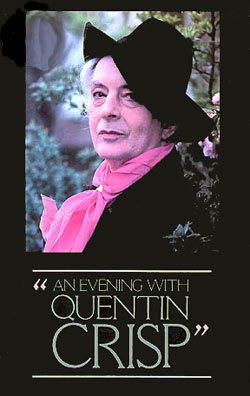 NK: As I said above, my first introduction to Quentin was with The Naked Civil Servant on British television in 1975. It truly was an exceptional piece of television. The critic Nancy Banks Smith said it “justified the existence of television”. This was pre-Internet era and even pre-videotape, or at least several years before videotape recorders would be used in private homes, so I wasn’t able to record it to watch again. It was broadcast at least three more times in the next few years, but other than that I really did not have access to anything else “Quentin” until the 1980s. However it had such a powerful impact on me that it stayed clearly in my mind and I’m sure influenced me as I grew into adulthood. I watched it just a few days ago and it remains as powerful and thought provoking as it was thirty-six years ago and, I suspect, still will be in another thirty-six years. NK: As I said above, my first introduction to Quentin was with The Naked Civil Servant on British television in 1975. It truly was an exceptional piece of television. The critic Nancy Banks Smith said it “justified the existence of television”. This was pre-Internet era and even pre-videotape, or at least several years before videotape recorders would be used in private homes, so I wasn’t able to record it to watch again. It was broadcast at least three more times in the next few years, but other than that I really did not have access to anything else “Quentin” until the 1980s. However it had such a powerful impact on me that it stayed clearly in my mind and I’m sure influenced me as I grew into adulthood. I watched it just a few days ago and it remains as powerful and thought provoking as it was thirty-six years ago and, I suspect, still will be in another thirty-six years.It was his honesty, courage, intellect and humanity that drew me to him. I still view him as an example of the best that a human being can be—a true-life hero. But it was also his insistence on being true to oneself that had a profound impact on me and on how I lived my life. As I was growing up and, again as I entered the work environment, I always felt a little apart from other people, or different. Of course, it could have been argued that I was going through a prolonged adolescence, but I just didn’t seem to fit in, socially. I always seemed to be marching to the beat of my own drum, though I didn’t realize why for many years. My “problem” was that I had a very high IQ and now am a member of British MENSA. I am sure that it was the example of Quentin’s life and his philosophy that greatly helped me during those years. TB: To go on about your research methods, can you speak a bit about what materials you focused on most in your analysis of Quentin’s life and life’s work? In other words, did you focus mostly on his own accounts as he gives them in his writings or did you use interviews and third party accounts to characterize him? I understand Quentin to be both a very compelling, if somewhat tricky, narrator in his own telling of his own story as well as a very public, or rather notorious, figure whose story is also told and retold largely by people who knew, or at least knew of him, and, in essence, I’m wondering if your book will focus more on a readerly account of Mr. Crisp through his telling of it or if it deals with his reputation and public image.
NK: I started with his, by then, three autobiographies. The Naked Civil Servant, How to Become a Virgin and Resident Alien, though Resident Alien was not actually written as an autobiography, it is a collection of his diary entries from The New York Native. And, yes, you are right that Quentin is a “tricky narrator”. He often moved incidents around in time, changed peoples name (usually to protect their privacy and perfectly understandably), and could be vague about certain situations and occurrences. He also left out large pieces of his life’s time line. By the time I started writing I knew enough about him to be aware of this aspect of his writings. So I knew that while these three books would be an invaluable starting point I could not rely entirely on them. I think that I have mentioned and referenced all of Quentin’s other books (there are sixteen in total) at some point and I found something interesting in all of them that in their own way revealed more about who Quentin was and how he thought. Also by then there had already been a number of books about Quentin. There was The Stately Homo [by Paul Bailey], which was a wonderful collection of interviews with people who knew Quentin. I found it to contain much information about him not in his autobiographies. Then there was Andrew Barrow’s book Quentin & Philip. He knew Quentin for decades and his book is chock-a-block with detailed information on Quentin. It was a significant help. Tim Fountain’s biography of Quentin was a great help when piecing together the events of the end of his life and his death in England, as was Tim’s documentary, The Significant Death of Quentin Crisp. But by far the most significant research was in talking to those people who knew Quentin, such as Guy Kettelhack, Penny Arcade, Tom Steele, Phillip Ward, Richard Gollner and a great many others mentioned earlier. So while my book uses Quentin’s own words as its base, I hope it goes far beyond that and looks at his life and his impact on the world through the unique eyes of many of those who knew him best. 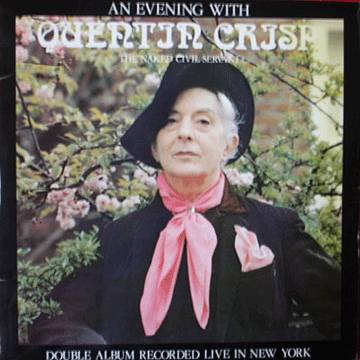 TB: Speaking of Quentin’s vast body of autobiographical work, I have two questions: First, while The Naked Civil Servant is still regarded as an important work as is certainly still enjoying a published life, most of his other texts are not very available commercially and certainly not read widely enough—why do you think this is? How do you see the whole collection of his writings: Are there texts you found more compelling and rich than others as you set out to find Quentin in his written archive? How can we ensure Quentin-the-Author a more respectable and respected place in this world of Twenty-First Century readership? TB: Speaking of Quentin’s vast body of autobiographical work, I have two questions: First, while The Naked Civil Servant is still regarded as an important work as is certainly still enjoying a published life, most of his other texts are not very available commercially and certainly not read widely enough—why do you think this is? How do you see the whole collection of his writings: Are there texts you found more compelling and rich than others as you set out to find Quentin in his written archive? How can we ensure Quentin-the-Author a more respectable and respected place in this world of Twenty-First Century readership?NK: Well, firstly, I think Quentin’s other works are not read because most people simply do not know about them. The majority of people think he wrote only one book in his life, The Naked Civil Servant. When speaking to anyone about Quentin and I tell them he actually wrote sixteen books, including two further autobiographies and two novels, they are surprised and interested in reading more. So I think it is a matter of getting the knowledge out there to the general public and then his other books will become more in demand. It is true that the most compelling book is The Naked Civil Servant, but many of his other works are filled of great stuff. How To Have A Lifestyle, Manners From Heaven, Resident Alien, even How To Go To The Movies, gives you a great insight into Quentin’s thought and opinions. Some of his other works are fascinating and unique like All This And Bevin Too. So, to repeat myself as he did many times, it is a matter of getting the knowledge of his other books out there into the general public. TB: And secondly, considering Quentin spent almost all of his life as a writer doing autobiographical work and that what little has been written and published since has largely been standard biographical, how would you say your book offers something new about Quentin’s life? Or rather, what perspective do you have to give on Quentin that is uncharted? NK: As I have said earlier, I think the book offers quite a few new insights into Quentin. It was not written just from my own perspective of him, but also from the perspective of those who knew him best. I have not rewritten or changed what these people told me about Quentin. I have presented it in the book as they related it to me—we get to see him from the perspectives of many different people. I think this is where my book differs. I hope this is what the reader will find most interesting and enlightening. Also, more, I think than any other book on him, I look at this unique philosophy and provide an appendix at the back of the book that presents many of his fascinating and thought-provoking comments on life and human society. TB: As a once active public figure, Mr. Crisp is quickly becoming a historical one—both in the queer studies cannon as well as for the English public. With that in mind, how would you like him to be remembered? As philosopher? Stylist? Queer icon? Or simply as an Iconoclast? 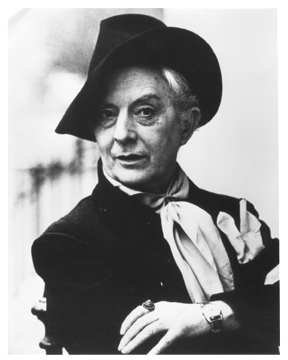 NK: I think, firstly, he should be remembered as a totally unique human being and as someone who showed us the best of what it is to be human; and, secondly, as a philosopher. His philosophy came out of and was born from who he was, but it is no good remembering his philosophy if we do not take it on board. I believe his philosophy has something positive to say to every single one of us. And certainly he was a great stylist, but his style came from his philosophy, just as his philosophy came from who he was as an individual. Unfortunately many people misunderstand his concepts on style. People often said to him, “You only want us to wear funny clothes!” to which he replied, “I want you to wear funny clothes if you’re funny people.” NK: I think, firstly, he should be remembered as a totally unique human being and as someone who showed us the best of what it is to be human; and, secondly, as a philosopher. His philosophy came out of and was born from who he was, but it is no good remembering his philosophy if we do not take it on board. I believe his philosophy has something positive to say to every single one of us. And certainly he was a great stylist, but his style came from his philosophy, just as his philosophy came from who he was as an individual. Unfortunately many people misunderstand his concepts on style. People often said to him, “You only want us to wear funny clothes!” to which he replied, “I want you to wear funny clothes if you’re funny people.”To Quentin, style was being true to your self, whatever that self was. To paraphrase him—if you find out that you are ordinary, then you must be so ordinary that you can imagine a friend being invited to a party and being told “bring your hum-drum friend” and you will know immediately that it means you. Unquestionably, though, he was a great iconoclast. Quentin challenged almost everything about society by making people think about how they behaved, making people look at their society and how it works and how it (they) treat people who are in anyway not what is viewed as “normal” or acceptable. So, to sum up, I would like Quentin Crisp to be remembered for who he was as a human being. But, in doing so, you cannot help but be influenced by his philosophy, even if you are not aware of it. Likewise you cannot help but be aware of him as an iconoclast who challenged society—and for you to step outside traditions to be more human.
|
||||||||||||||||
